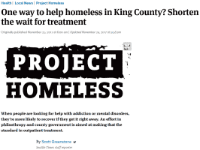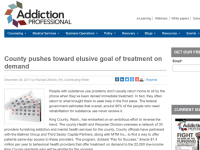
The Project
The Project
- Third Sector worked with King County’s Outpatient Treatment on Demand Initiative to direct approximately $115M annually in outpatient behavioral health funding toward an increased outcomes focus. The initiative serves as an exemplary model for the County’s shift in Medicaid toward Value-Based Purchasing, and has helped institutionalize a continuous improvement mindset. King County is now developing a second outcomes-oriented contract for individuals charged with domestic violence and have substance use disorder (Promoting Peace and Recovery Pilot).
- The County will pay contingent bonus payments based on metrics related to timeliness of offered intake, actual intake, and connection to routine care. The County sends provider agencies a monthly data update on performance across metrics and coordinates a monthly learning community for provider agencies in order to support continuous improvement.
- Provider agencies are eligible to receive an incentive payment of up to two percent of their outpatient case rate, dependent upon meeting identified metrics (up to $2.3 million countywide annually). King County has provided the first semi-annual bonus payment upfront to all providers who opted to participate in the initiative in order to assist them in initiating practice changes related to treatment on demand. Agencies can also apply to the County for funds to obtain nationally-recognized consultation to assist agencies with making process changes that support treatment on demand.
Innovations and Implications
Innovations and Implications
The Treatment on Demand project leveraged several innovations that helped enable scale and speed:
- Multi-provider negotiations: Third Sector and the County engaged the entire provider network for input on key terms. While the County reserved final decision-making power, providers ultimately decided whether or not they wanted to participate in the initiative. Twenty-three of the 29 eligible service providers agreed to participate.
- Focus on existing funding streams: The King County project relies completely on existing funding streams and is embedded in existing programming. Given that there was no need to secure County Council approval or manage outside investors, this design helped minimize upfront transaction costs and time.
- Contract amendments: The County formalized the project using a single contract amendment in all provider agency contracts. This amendment referenced a separate term sheet (i.e., program guidelines) that outlined all initiative details. This strategy allows for flexibility to revise details without having to change 23 different contracts.
- Pricing based on meaningful drivers of change: The County set outcomes prices (bonus payments) based on discussions with provider agencies about what would be meaningful and feasible to providers given the costs required to improve existing practices. Taking this approach helped gain buy-in from a wide, diverse provider network, and no cashable savings analysis was involved in this process.
Government: King County, Washington
Government: King County, Washington
King County is the largest county in Washington state and the 13th largest in the United States. It encompasses 39 cities and towns and has a total two-year budget of $11.4 billion. With a population of 2.1 million, approximately 50,000 individuals receive outpatient mental health or substance use treatment in the county ever year. The County wanted to improve rapid access to outpatient behavioral health care and follow-up in order to improve patient health outcomes and avoid crisis outbreaks.
Other Project Partners
Other Project Partners
Government Advisor & Transaction Coordinator: Third Sector Capital Partners, Inc.
Early Community & Project Supporters:
Press
Press
"One way to help homeless in King County? Shorten the wait for treatment"
The Seattle Times
"County pushes toward elusive goal of treatment on demand"
Behavioral Healthcare, EXECUTIVE
Additional Information
Additional Information
- Read the county's Press Release about the project
- Read the Program Guidelines
For more information or inquiries, please contact info@thirdsectorcap.org.




